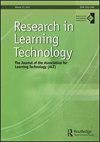A theoretical framework for digital learning spaces: learning in individual spaces, working groups, communities of interest, and open connections
IF 1.2
Q2 EDUCATION & EDUCATIONAL RESEARCH
引用次数: 1
Abstract
The paper presents a theoretical framework of four digital learning spaces: Individual space, Working group, Community of interest, and Open connections. The theoretical framework aims to highlight the unique potentials of digital technologies to expand learning activities. More specifically, the framework contributes with descriptions of specific learning activities that highlight the learning potentials of different social forms as well as learning potentials of digital technologies. The paper highlights learning potentials of digital technologies within each learning space; digital technologies as cognitive partners, collaboration tools, sharing tools, and as network relations and network effects. The framework is developed on the shoulders of existing educational frameworks, and contributes to learning technology research by combining conceptions of social forms, learning theory, and digital technology studies. Further, the framework is directed towards educational practice as a tool to develop learning activities, and to design digital learning spaces. The framework intends to function as a guiding framework that can help teachers and developers to focus on different levels of learning spaces and specific learning activities. Finally, the paper argues that digital technologies have the potential to expand opportunities for learning: specifically, to expand individual agency (within the individual space), collaborative knowledge building (within the working group), transparency (within a community of interest), and interaction with the outside world (through open connections).数字学习空间的理论框架:在个人空间、工作组、兴趣社区和开放连接中学习
本文提出了四个数字学习空间的理论框架:个人空间、工作组、兴趣社区和开放连接。该理论框架旨在强调数字技术扩展学习活动的独特潜力。更具体地说,该框架有助于描述具体的学习活动,这些活动突出了不同社会形式的学习潜力以及数字技术的学习潜力。本文强调了数字技术在每个学习空间中的学习潜力;数字技术作为认知伙伴、协作工具、共享工具以及网络关系和网络效应。该框架是在现有教育框架的基础上发展起来的,结合了社会形态、学习理论和数字技术研究的概念,为学习技术研究做出了贡献。此外,该框架面向教育实践,作为开发学习活动和设计数字学习空间的工具。该框架旨在作为一个指导框架,帮助教师和开发人员关注不同层次的学习空间和具体的学习活动。最后,本文认为数字技术具有扩大学习机会的潜力:具体而言,扩大个人能动性(在个人空间内)、协作性知识建设(在工作组内)、透明度(在利益共同体内)以及与外部世界的互动(通过开放连接)。
本文章由计算机程序翻译,如有差异,请以英文原文为准。
求助全文
约1分钟内获得全文
求助全文
来源期刊

Research in Learning Technology
EDUCATION & EDUCATIONAL RESEARCH-
CiteScore
6.50
自引率
0.00%
发文量
13
审稿时长
20 weeks
 求助内容:
求助内容: 应助结果提醒方式:
应助结果提醒方式:


